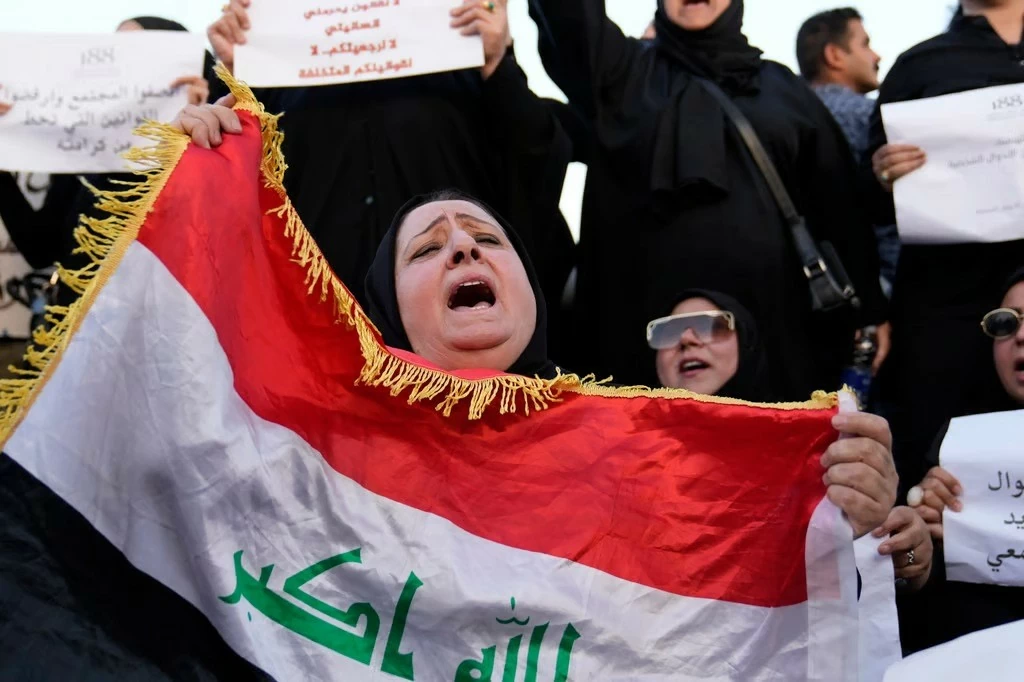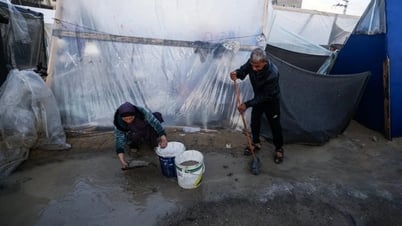The Iraqi parliament is considering a draft law that would allow people to go to religious courts to resolve family law issues, including marriage.
 |
| Iraqi women protest against a bill that would allow marriage of underage girls in Tahrir Square in Baghdad on July 28. (Source: AP) |
“Bringing the country back 1,500 years ago”
Shaimaa Saadoun is haunted by the memory of her violent marriage to a 39-year-old man when she was 13, in the hope that a dowry of gold and money would help her family escape poverty. “I was forced to become a wife and mother while I was still a child. No child or teenager should be forced into the life I went through,” Saadoun said.
Mrs Saadoun's marriage was illegal, but a judge related to her husband approved it, despite Iraqi law setting the minimum age for marriage at 18.
But such marriages could soon be legalized by the state. Iraq’s parliament is considering a bill that would give clerics more power over family law, a move that has prompted human rights groups to warn of the dangers of marrying girls as young as nine.
The proposed amendments come mainly from Shia Muslim political factions backed by religious leaders who argue that the West is imposing cultural norms on Iraq, a Muslim-majority country.
The draft law would allow Iraqis to seek religious court jurisdiction in family law matters, including marriage, which are currently the domain of civil courts. It would allow clerics to rule on their interpretation of Shariah, also known as Islamic law, rather than national law. Shariah law allows for the marriage of girls as young as nine, or even under Jaafari Islamic law.
Many Iraqi women have reacted strongly by protesting outside the parliament and calling for opposition to the bill on social media. Heba al-Dabbouni, an activist who participated in the protest, said the Iraqi parliament’s job was to pass laws that would improve social standards, not “take the country back 1,500 years.”
“We will continue to protest until our last breath,” al-Dabbouni added.
Conservative lawmakers, however, say the amendments give people the right to choose between civil or religious law, and argue that the state is protecting families from Western secular influence.
 |
| The new bill raises concerns about its negative impact on the rights and interests of Iraqi girls. (Source: Iraqi Children) |
Mixed opinions
The debate has been heated in the Iraqi media, even among clerics. Some have argued against lowering the marriage age, saying it is harmful to girls.
Meanwhile, Shia cleric Rashid al-Husseini asserted that Shariah law allows marriage to 9-year-old girls, but this may only account for 0% or 1% of the practice. Parliament was scheduled to hold a preliminary vote on the law on September 2, but it was postponed due to a lack of quorum.
Iraq's Personal Status Law, passed in 1959, is considered a solid foundation for protecting the rights of women and children. It sets the legal age of marriage at 18, but allows girls as young as 15 to marry with parental consent, medical certification of puberty and menstruation.
MP Raed al-Maliki sees the changes as a defense against Western secularism. Criticism of Western culture has grown since the outbreak of the Israel-Hamas conflict, with most Iraqis expressing sympathy for Palestinians in the Gaza Strip and viewing US claims of human rights as phony.
This is not the first time that Iraq has introduced similar drafts over the past decade, and Shia parties are now moving toward a consensus on the law. While Shia parties previously had different priorities, focusing more on the conflict that has been raging in the country for two decades, the priorities have now shifted to cultural issues, according to Harith Hasan, a scholar at the Carnegie Middle East Center.
Mr Hasan also said the bill would create “sectarianism” in Iraq and weaken military courts, as religious authorities would have more power to handle matters such as marriage, inheritance and divorce. This process would inadvertently create two parallel powers, leading to chaos in the country.
Ms Saadoun, who lives in Irbil, in Iraq’s autonomous Kurdish region, expressed concern about the fate of women and girls in the country. “The new amendments to the Personal Status Law will destroy the future of many girls and the consequences will last for generations,” Ms Saadoun said.
Source: https://baoquocte.vn/muon-tranh-anh-huong-cua-phuong-tay-cac-dang-phai-o-iraq-dua-ra-mot-du-luat-bi-tranh-cai-gat-285121.html


![[Photo] Prime Minister Pham Minh Chinh chairs conference on anti-smuggling, trade fraud, and counterfeit goods](https://vphoto.vietnam.vn/thumb/1200x675/vietnam/resource/IMAGE/2025/5/14/6cd67667e99e4248b7d4f587fd21e37c)

















![[Infographics] Vietnam re-elected Chairman of the World Customs Organization's Standing Technical Committee](https://vphoto.vietnam.vn/thumb/402x226/vietnam/resource/IMAGE/2025/5/14/ae5e22967ce14621b808fd71d3308f63)














































































Comment (0)